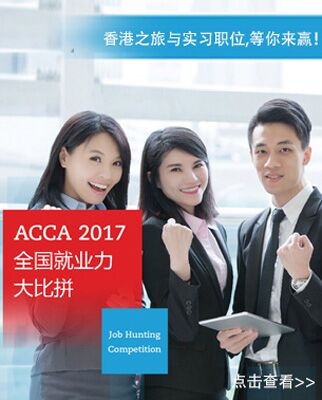THE ACCA WEBSITE INCLUDES ONLY ONE SAMPLE PILOT PAPER FOR F1, F2 AND F3. ARE THERE PLANS TO INCLUDE MORE PAST EXAM PAPERS?No, there are no plans to publish more F1, F2 and F3 papers on our website. Please read the study guides produced by our official publishers for further examples of exam questions.
MOST THEORISTS LISTED IN THE STUDY GUIDE ARE FROM THE UK OR USA. ISN'T THIS RATHER UK/USA 'CENTRIC?The syllabus covers relatively few theories or models. Those selected are well-known and easy to understand. The idea is that candidates should understand how theories or models help people to think about issues. Inclusion of a theory or model does not necessarily mean that it is regarded as being the best in its area or well-validated.
HAS INCREASING THE USE OF "SCENARIOS" IN MULTIPLE-CHOICE QUESTIONS MADE EXAMS MORE CHALLENGING?We have analysed our candidates' exam results and found no evidence of a difference in pass rates for this type of question as compared with other types.
We have included scenario-type questions in this paper to better prepare candidates for papers F2 and F3, where they need to apply their knowledge more than remember facts.
"Scenarios" on this paper are generally short and tuition providers are now much better at preparing candidates for the wide range of question styles they will encounter.
HOW DO THE EXAM QUESTIONS REFLECT THE CONTENT OF THE STUDY GUIDE?Most questions are dedicated to only one subject area of the study guide; questions will not combine areas nor will one scenario be used as the basis for more than one question.
There are an equal number of questions drawn from each area of the syllabus, whether candidates are doing a computer-based or paper-based exam. This means about eight or nine questions for each section of the syllabus.
HOW DO THE PASS RATES COMPARE FOR COMPUTER-BASED AND PAPER-BASED EXAMS?Pass rates for the two exams are broadly similar. We have found that candidates tend to choose the exam type which is convenient for them, rather than just a particular format because they think it will be easier.
THE TOPICS COVERED IN THE F1 PAPER PROVIDE A FOUNDATION OF KNOWLEDGE NECESSARY FOR STUDENTS GOING ON TO TAKE P3. HOWEVER, P3 CONTAINS QUESTIONS REQUIRING ESSAY-STYLE ANSWERS, NOT SHORT ANSWERS LIKE IN F1. DOES THIS MAKE IT DIFFICULT TO PASS P3?No, because candidates have to take exam F4 before P3, and F4 contains questions requiring essay-style answers. Candidates will have plenty of practice in writing essay-style answers in the run up to their P3 exams.
HAS ECONOMICS BEEN REMOVED FROM THE SYLLABUS?No, it is included within Section A of the new syllabus and a new subject area A5 has been added, focusing on basic aspects of micro economics.
WHAT STRUCTURAL CHANGES WERE INTRODUCED IN F1, ACCOUNTANT IN BUSINESS IN FEBRUARY 2014?From February 2014 the CBE and paper based exams for F1 changed from the old format of 50 two mark objective test questions to a new structure. The new structure has 30 two mark objective test questions, 16 one mark questions and six four-mark questions. The style of the paper now allows ACCA to examine more application than was possible under the old format, but ensures that a sufficient breadth of the syllabus can be assessed on each occasion. Each of the four mark questions assesses one of the main sections/syllabus headings of the syllabus.
THE ACCA WEBSITE INCLUDES ONLY ONE SAMPLE PILOT PAPER FOR F1, F2 AND F3. ARE THERE PLANS TO INCLUDE MORE PAST EXAM PAPERS?No, there are no plans to publish more F1, F2 and F3 papers on our website, but there is a specimen paper which gives an example of the new style exam including the new longer type questions. In addition there is an additional complete set of specimen longer type questions for candidates to get additional practice on these newer questions.
Online, interactive Practice Tests are now also available for all Foundations level papers and F1, F2 and F3. Each paper including F1 has a set of three Practice Tests that prospective candidates can purchase singly or as a complete set. These tests replicate a live exam experience and contain the types of questions that candidates might be given at a real exam.
Not only do these tests provide a valuable experience of how to experience or navigate through such exams, they also score candidates’ performance in each main section of the syllabus, using a traffic light system to present this interactively. In addition, the questions that the candidate has got correct, partially correct and incorrect are identified for each main syllabus section. Finally feedback on each question in the paper is given so that candidates can see where they have gone wrong and which can be used as a valuable revision tool. Access to the Practice Tests and information on how to purchase them is on the ACCA website
THE F1 SYLLABUS CONTAINS REFERENCES TO NAMED THEORISTS AND SPECIFIC MANAGEMENT AND ORGANISATIONAL MODELS. WILL EXAM QUESTIONS ONLY SPECIFICALLY EXAMINE THESE?The syllabus covers relatively few theories or models. Those selected are well known and relatively straightforward to understand. The idea is that candidates should understand how theories or models help people think about issues. The inclusion of a theory or model does not necessarily mean that this is regarded as the only relevant theory in the area, but is one that is most well recognised in the management literature. F1 will not examine specific theories or models which are not explicitly named somewhere in the syllabus, so it is worth gaining a good knowledge and understanding of those which are.
HAS CHANGING THE STRUCTURE OF THE F1 EXAM AND THE GREATER USE OF SCENARIOS MADE EXAMS MORE CHALLENGING?We have analysed our candidates' exam results and found no significant evidence of a difference in pass rates for this type of question as compared with other types. However, this type of question makes the question more practical and relevant for the workplace and therefore increases the validity of the examination as a whole.
We have included scenario-type questions in this examination to better prepare candidates for the Fundamentals Skills module, where they need to apply their knowledge further.
WILL F1 QUESTIONS EVER INVOLVE CALCULATIONS?F1 is mainly an examination testing verbal knowledge and skills. However, there are aspects of the syllabus such as subject areas A4 and A5 which examine macro and micro economics, which may involve some calculations. Example of these would be questions about aggregate demand in the economy and those involving elasticity and cross-elasticity of demand.
WHY IS THE PASS RATE FOR F1 SOMETIMES SIGNIFICANTLY HIGHER THAN THAT OF F2 AND F3?Candidates for F1 are usually well prepared for their examinations and the F1 syllabus is a very broad and knowledge based syllabus about business in general. Some candidates may have acquired knowledge of many of the business areas covered in the exam before they registered with ACCA in previous studies but also through their exposure to business media. But mainly the preparedness of candidates can be attributed to the excellent coverage of this examination in the official study texts and by tuition providers. Currently pass rates for F1 appear to be settling down and we would expect them to become more consistent with those of F2 and F3 over time.
WHAT ARE THE MOST SIGNIFICANT SYLLABUS CHANGES INTRODUCED INTO F1 RECENTLY?Apart from the wider assessment of economics to include more on micro economics in subject area A5 introduced a couple of years ago, more recently F1 has widened its scope to include new areas on modern ways of structuring businesses such as the growth of shared service centres, outsourcing, offshoring and the emergence of boundaryless, modular, hollow and virtual organisations. The ACCA study textbooks are now expected to cover these new areas. Some other areas in leadership, communication and personal effectiveness have now been combined and rationalised. For a review of the summary of changes in the F1 syllabus candidates should refer to the Study Guide for the examination on the ACCA website.





